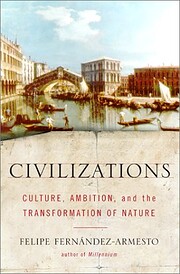

Pulse en una miniatura para ir a Google Books.
|
Cargando... Civilizations : Culture, Ambition, and the Transformation of Naturepor Felipe Fernández-Armesto
 Ninguno Actualmente no hay Conversaciones sobre este libro.  This book attempts to define civilisation as the ability for a group of peoples to live within, harness and ultimately transcend the geographic environment in which they find themselves, rather than as the result of any intellectual, spiritual or socio-economic drivers. In support of this argument we are given a whistle-stop tour of pretty much every civilisation across the world and back into time for which historical evidence of some kind exists. The book examines civilisations in a loosely chronological way grouped by their geographic environments: tundra, desert, prairie, savannah, steppe, tropical lowlands, alluvial soils, highlands, seaboard, maritime and finally oceanic. The examples are so many that even in a book of over 500 pages each one is afforded only a handful of pages at most. Eventually this overwhelms the reader (well, this reader) and all these different groups of people start to merge together or overlap in the mind. Clearly, Fernandez-Armesto is an extraordinarily erudite historian and writer and has produced a book with levels of depth and scope not matched since Toynbee. For the lay reader this book would benefit enormously from the inclusion of maps. The subtitle for Felipe Fernandez-Armesto's amazing book references culture, ambition and nature. These ideas are all central to his history of civilizations, but as he states near the end of the book it is a "book of places". That is an overriding theme that is underscored by the many diverse civilizations that he discusses. Thus the book is a history of civilizations, not one civilization; and it is also about the power and ambition of mankind that he uses to tame geography, ecology, climate and other animals to form cities. Although, the author argues in his introduction that cities are not a necessary condition of civilization no matter how frequently they have been associated with the rise of civilization in history. Like all history the book presents an empirical argument with examples of civilizations from grasslands and forests, arid and rain-filled climates, highlands and ocean-based areas. It is a tribute to the intelligence and adaptability of man that civilizations can be found in places as disparate as the Andes and the Aegean; the Euphrates and post-glacial European forests; the Indus, Yellow, and Yangtze rivers of Asia; and other places. The result of Civilizations wide-ranging, through time and geography, ruminations and revelations is a book that is informative and thoughtful. Undoubtedly controversial at times, it is an exciting read for anyone interested in the ability of man to create and mold the world into civilizations. A decent book, but it's just uninspiring. The author has clearly aimed this book for a broad public by adopting a very simple and non-analytical approach to world history, grouping civilizations by climate. His wide range of examples is fairly entertaining but most of his generalizations are completely obvious to any person with a little bit of background in history and geography. Maybe this text would be best suited as an introduction to world history for young students . sin reseñas | añadir una reseña
Para el autor ,la civilización no es el resultado de una estructura política, estética o religiosa, sino del intento cultural de readaptar el entorno. No se han encontrado descripciones de biblioteca. |
Debates activosNingunoCubiertas populares
 Google Books — Cargando... Google Books — Cargando...GénerosSistema Decimal Melvil (DDC)909History and Geography History World historyClasificación de la Biblioteca del CongresoValoraciónPromedio: (3.9) (3.9)
¿Eres tú?Conviértete en un Autor de LibraryThing. |
||||||||||||||||||||||||||||||||||||||||||||||||||||||||||||||||||||||||||||||||||||||||||||||||||||||||||||||||||||||||